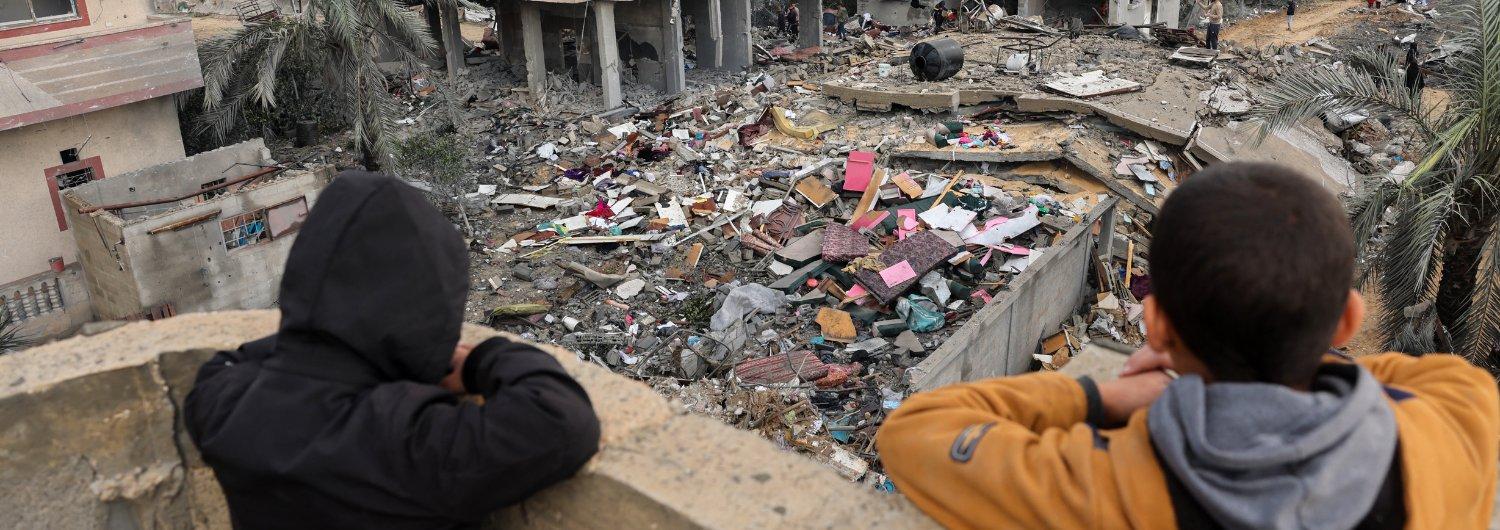News
Attacks in Rafah jeopardise our humanitarian work
13/02/24

Palestinian children look at the rubble of a building destroyed during Israeli attacks in Rafah, southern Gaza Strip, last November © Mohammed Abed / AFP
The military operation in southern Gaza, where more than 1.3 million people and a dozen of our colleagues are sheltering, puts at risk our distributions of water, food, hygiene kits, shelter or waste collection and cleaning services to prevent the outbreak of diseases.
In the last 4 months, Action Against Hunger has been able to provide fresh and dry food baskets, cash assistance and water, hygiene and sanitation projects to some 320,000 people trapped in Rafah, a place where more than half a million people are suffering from a catastrophic food crisis.
The current escalation of violence in southern Gaza is a further threat to humanitarian aid. "If the military operations in Rafah continue and expand, Action Against Hunger will be forced to suspend its activities in Rafah. Although we work throughout the whole Strip, this is one of the areas where we have the most active operations, and where many of our colleagues are located," warns Noelia Monge, Head of Emergencies for Action Against Hunger.
"These activities include water trucking, solid waste collection, cleaning services and the distribution of hygiene kits and food - life-saving activities - and would be virtually disrupted, stripping a population of their most basic needs and forcing them to relocate yet again at a time when they need us most. Ten of our staff and their families will be forced to flee, once again, and we will lose access to our newly established office, warehouse, and guesthouse," she adds.
Over the past four months, Action Against Hunger has provided fresh and dry food baskets, cash assistance and water and sanitation activities to some 320,000 people trapped in Rafah, including pregnant women, nursing mothers, newborns and families with dependent children. Disruption of these activities would have incalculable repercussions, especially when more than half a million people face catastrophic conditions of food insecurity - even more alarming as this is the highest proportion compared to other populations in food security crisis and above the global Integrated Food Security Phase Classification (IPC) records.
In addition, the severe lack of adequate water and sanitation has led to diarrhoea and disease. The World Health Organisation reported more than 161,000 cases of diarrhoea (some 85,000 of them in children under five) and almost 246,000 cases of acute respiratory diseases across the Gaza Strip. However, cleaning services, mobile latrines and solid waste collection carried out by Action Against Hunger reach at least 350,000 people in Rafah. Other services, such as shelters and hygiene kits, reach more than 87,000 people. The military operations in Rafah threaten the continuity of these services, all of which mitigate a crisis of a complex nature.
Our humanitarian response is already suffering severe constraints in Gaza due to the continuing lack of security, access, supplies and space to operate. Action Against Hunger warns that anything short of an immediate ceasefire and a massive increase in aid would be a historic failure to protect civilians in armed conflict and calls on the international community and donors to take all possible steps to achieve this goal: to protect civilians, secure humanitarian aid and avoid even more severe repercussions from this crisis.
Action Against Hunger is an international humanitarian organisation fighting the causes and effects of hunger. By 2022, we will reach 28 million people with our activities. We save the lives of malnourished children. We ensure that families have access to clean water, food, education and basic medical care. We support refugees in their most basic needs. In Spain we facilitate access to employment for vulnerable people as a tool to escape exclusion, poverty and food insecurity.